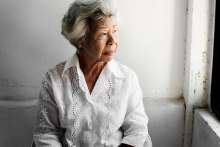

YCharOS antibody characterization platform addresses the “reproducibility crisis” in research
An innovative research project led by researchers at The Neuro has been awarded $1.5M by the Government of Quebec through CQDM.
YCharOS is an innovative platform led by neuroscientists Peter McPherson and Carl Laflamme that validates antibody reagents for human proteins.

$1M grant from The Weston Family Foundation will pave the way for earlier intervention in REM sleep behaviour disorder and Parkinson’s disease
REM sleep behaviour disorder (RBD) is an often debilitating condition that causes people to act out in their sleep, sometimes violently. What’s worse, people with the disorder often go on to develop Parkinson’s disease.

$1.14 million from CIHR will resolve treatment roadblocks for rare brain disorders
Gene therapy for rare neurological disorders will move one step forward thanks to a $1.14 million grant from the Canadian Institutes of Health Research (CIHR).

Thomas Durcan’s project will dissect the role of microglia in degenerative conditions, to identify new therapeutic strategies for Alzheimer's treatment
An innovative new program based at The Neuro has received $2.6 million from the CQDM and the Brain Canada Foundation.

MRI data from large sample shows increased whole-brain connectivity in people with a second language
Neuroplasticity is the brain’s ability to build connections within itself, adapting to the surrounding environment. The brain is most plastic in childhood, forming new pathways in reaction to stimuli such as language.

Scientists use stem cells to follow development of protein bodies characteristic of neurological disease

Honour is recognition for a lifetime of leading research
Alan Evans, a researcher at The Neuro, James McGill Professor of Neurology and Neurosurgery and co-director of the Ludmer Centre for Neuroinformatics and Mental Health, has been elected to the Fellowship of the Royal Society, joining a class of scientists that includes a Nobel laureate and a former Chief Medical Advisor to the US President.

Researchers will study how hormones affect brain cancer and the role of neural circuits in social skills
The Paris Brain Institute and the Institut Pasteur have partnered with The Neuro to fund two groundbreaking studies, each receiving more than $440,000. These projects are part of an international collaboration to address future challenges in neuroscience.

McGill Translational Platform in Autism Research will help uncover the disorders’ neural foundations
A new project at The Neuro, McGill University and the Research Institute of the McGill University Health Centre (RI-MUHC) has been awarded $10.6M in financial support as part of the Canada Foundation for Innovation’s (CFI) Innovation Fund.

New paper argues that Large Language Models can reveal breakthroughs humans alone cannot

Researchers propose a new model for classifying Parkinson’s
One of the things that makes developing effective treatments for Parkinson’s disease so challenging is its complexity. While some forms are caused by genetics, others have environmental factors, and patients can show a wide range of symptoms of varying severity. Diagnosis of Parkinson’s is also currently made very late, after the disease may have been in the brain for a decade or more.
The Centre for Addiction and Mental Health (CAMH) joins the Tanenbaum Open Science Institute alliance in a partnership to open research practices

Machine learning tutors affect learners in unforeseen ways, both positive and negative
Virtual reality simulators can help learners improve their technical skills faster and with no risk to patients. In the field of neurosurgery, they allow medical students to practice complex operations before using a scalpel on a real patient. When combined with artificial intelligence, these tutoring systems can offer tailored feedback like a human instructor, identifying areas where the students need to improve and making suggestions on how to achieve expert performance.

